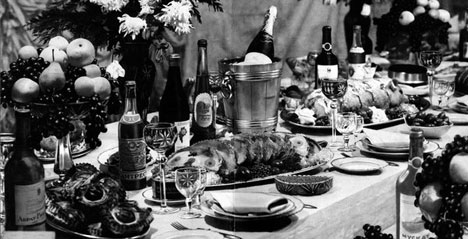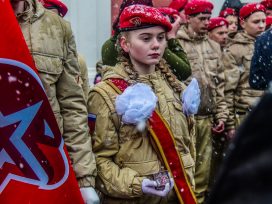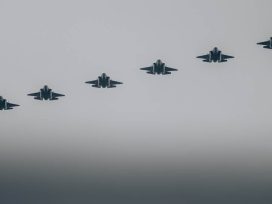As Russia becomes more and more isolated, the Russian government will need to provide for all those who support it. Maxim Trudolyubov explains why those who can provide for themselves will be the first victims of western sanctions and Russian countermeasures.
Western sanctions imposed on Russia since the annexation of Crimea and the start of war in eastern Ukraine do little to punish those against whom they are directed. Similarly, the Kremlin’s response to those sanctions does not have the intended effect either. In fact, it can be said that the West and the Kremlin work hand in hand in taking social relations in Russia back to the past.
In response to the decision to freeze the assets of certain Russian citizens and restrict the business activities of some Russian companies in the West, Russia imposed a ban on the importation of meat, poultry, fish, cheese, vegetables and fruit from the United States and the European Union. Many in Russia not only shrugged off those measures, gleefully recalling the shortages of the Soviet era, but actively supported them. At least some of the opinion polls have shown that 84 per cent approve of the embargo on food imports. Most are convinced that the ban will help revive domestic agriculture – which mainstream economists dispute.

A spread from a classic Russian cookbook. “Mastering the Art of Soviet Cooking”
The story probably will not end here. In the future, motor vehicles and medical equipment from countries that have imposed sanctions on Russia may also be banned. If things continue the way they have been going, Russia will have to go without more and more essential, not readily replaceable goods. Consumption will be lower and life will become simpler in terms of relations between the people and social institutions on the one hand and the state on the other. We will face a situation in which the state will be the only source of food and shelter. It is not the first time such a situation has been seen in Russia.
A giving hand
The decision by the Bolsheviks to transfer the seat of Russian government from Petrograd to Moscow in 1918 was a very significant act. They moved the capital in space as well as in time. The St. Petersburg era came to an end and a new Moscow era began. A received, poorly understood idea of historical progress didn’t take Bolshevik Russia into an advanced proletarian future but into a kind of Soviet Muscovy, an archaic, pre-St. Petersburg system garnished with communist rhetoric.
“As they settled down in the Kremlin, the Bolsheviks inherited a chronotope corresponding to the height of power in the sixteenth and seventeenth centuries. At the time, the most pronounced and obvious attribute of power was its feeding function”, writes historian Tamara Kondratieva. The Supreme Ruler in those days was not only positioned at the top of the administrative pyramid, but he also stood at the top of the food chain, based on the biological principle whereby creatures at the top of the food chain feed on those positioned below them, who in turn feed on the lower rung, and so on. Or, quite literally, the sovereign was seated at the head of the main dining table in the country, which was located in the Kremlin.
Those who were received at court got a salary, but they were also given a “gift of sustenance” – meat, fish, wine, malt, hay, etc. During holidays, a boyar may receive a more substantial gift, such as a fur coat or a length of expensive fabric. If the Czar’s holiday gift was withheld, it was a very bad sign indeed. In this way, power indicated that it could cut off the supply of food to a guilty party. The offender would then have to negotiate with the right person or expect to be banished. That meant procuring one’s own food. At court, whether or not you went hungry – literally as well as figuratively – depended on your place at the Kremlin table.
Having moved the government to Moscow, the Bolsheviks raised the old system of relations to a new level. It happened quite naturally, given the circumstances at the time. The Kremlin had to become the main source of food and other goods simply because the new government had destroyed the old St. Petersburg institutions, notably the market economy and private property, that made people responsible for their own wellbeing. The Communist government had to quickly provide food for the starving country and shelter for the homeless. The social revolution decreed by the Bolsheviks entailed taking food and lodgings from those who were seen as enemies by the new rulers, i.e., the old propertied classes, and distributing them among those who were its supporters, i.e., workers and peasants. It was not even the first time in Russian history that such redistribution had occurred.
In 1918, the new government declared a food dictatorship, which was allegedly required to fight the “rural bourgeoisie” – meaning the peasants – who did not want to give up their grain to the state without any compensation. The requisitioning of foodstuffs, originally introduced by the Czarist government during World War I, was carried to its logical extreme by the Bolsheviks. They set up food requisitioning detachments that scoured the countryside, seizing corn by force. At the same time, the Central Executive Committee and Council of People’s Commissars established the first cafeteria for their own staff. The rations were distributed to the new Soviet aristocracy based on a strict hierarchy. In the hungry summer of 1922, when millions of peasants died of starvation in the Volga region, Vladimir Lenin got 3.2 kg of sugar and 1.6 kg of butter per month, other leaders about 2.5 kg and 1.3 kg, respectively, and the rank and file 500 g of sugar and 100 g of butter.
Later on, the distribution system of food and other goods was broadened and got more complex. A network of special stores was created, with special access limited to the elite. There was a system of special orders open only to a group of privileged consumers from the party, managerial and creative elites. They could get food and consumer goods not available to the rest of the population, and at a reduced price. (The term “order” or zakaz, which all who lived in the Soviet Union remember well, is interesting in that even the privileged consumer never actually ordered anything personally but had to be content with whatever had been provided to him by the all-knowing system.) The highest elites also had access to better quality medical care in special âclosed” clinics and hospitals.
During Stalin’s era, the feeding function of the state was physically embodied in Kremlin banquets, at which party leaders feted pilots, explorers, Stakhanovite workers and military and security officers. Historian Sigurd Schmidt, who personally attended Stalin’s banquets, recalls that their etiquette and seating arrangement strikingly resembled those described by the eyewitnesses at the Tsar’s feasts of the sixteenth and seventeenth centuries.
At the same time, the redistribution of housing also commenced. Private ownership of residential property was banned and all urban housing was nationalized. City councils started to move people from one apartment to another, shuffling social classes off into communal apartments and taking away âexcess” square feet from the old propertied classes for the benefit of the poor. New tenants moved into apartments abandoned by those who emigrated. To destroy the old class system, the new government also worked to move workers from the outskirts to the houses of the rich and to apartments in central areas of cities. Thanks to this policy, the proportion of working class residents within Moscow’s Garden Ring grew from 5 per cent in 1917 to between 40 and 50 per cent in 1920. By 1924, over 500,000 workers and their family members were relocated into nationalized housing, according to architectural historian Vladimir Paperny.
The Muscovy model of relations between government and society, restored and expanded by the Bolsheviks, kept evolving throughout the Soviet period. The government increasingly affirmed its role as breadwinner, and Soviet elites rallied ever closer around the Kremlin table in concentric circles: the closer to the table, the more abundant the supply. Those who did not like this model were initially banished from the country, and later fed by force. Those who resisted were imprisoned or killed.
The main function of the elites was to be privileged consumers of food, large apartments, country homes and cars. The rest had to be content with smaller food rations and wait for decades to receive housing and summer homes. By the end of the Soviet period, thanks to a massive housing construction programme carried out by Nikita Khrushchev and Leonid Brezhnev, more than half of the population lived in their own apartments, but the shortage of food was never effectively overcome under the Communists.
Superfluous men
For those who fed at the table of power, the falling crumbs were also a symbol of a social contract between the state and its citizens, the rules of which were clear to both sides.
The unspoken agreement stipulated that privileges were not bestowed unconditionally. The state was under no obligation to provide food, and it did so strictly in exchange for loyalty and the fruits of everyone’s labour. All citizens, from the highest official with access to the most generous privileges to the ordinary ration-card holder, could lose access to food and shelter if they breached this contract. The list of offences and corresponding punishments varied widely from one period to another. What could bring a death sentence under Stalin may result in no more than dismissal under Brezhnev. But the benefits always remained conditional and depended on loyalty.
In today’s Russia, the state retains its useful ability to take away the benefits of those who prove disloyal. But it no longer performs the role of an exclusive feeding hand for all citizens in all segments of society. An oil company can be seized, but it is more difficult to take away something that a person has built with his or her own hands. In today’s Russia, there is an important island of independence, whose inhabitants are under no obligation to the state because they are able to provide for themselves.
The main achievement of the post-Soviet period has been the emergence of a large number of people who do not need to be fed from the table of power. Over the past twenty-three years many of us have learned to produce, sell, create, paint, write books – in short, to work independently and to earn our own keep, without relying on the state and its giving hand. There are few such independent people as yet, but they’re the best that Russia has to offer.
Such people can be described in many ways, though no single description will be satisfactory. We can make use of social scientist Natalia Zubarevich’s classification of four Russias, which she described in a 2011 article in Vedomosti. Such individuals are fairly well represented in large cities (Russia-1), and there is a smattering of them in medium-sized cities around the country (Russia-2). Not all of them belong to the educated classes, since they include those who work independently and earn a living as, for example, truck drivers or owners of small shops.
Historian Yuri Pivovarov has introduced a social category of superfluous men, individuals and groups who have not been ground down by the Russian state or incorporated into its power structure. They belong neither to the ruling elites nor to the passive population. Their unifying characteristic lies in the fact that they have nothing to do with the feeding hand of the state.
Beyond this, they have little in common. In fact, it is easier to see what divides them than to identify ways in which they are similar. They belong to different professions and social groups, they may vote for different parties or not vote at all and they may have conflicting views on the country’s future. They may argue bitterly when they come face to face. But this actually proves the point: they are independent and do not need to agree. Incidentally, this is why the protest movement that emerged in 2011 and 2012 did not create a single opposition party.
Former oligarch Mikhail Khodorkovsky described recently in interview with The New Times how Vladimir Putin interacts with this segment of society: “He seems to relish the role of a Russian Deng Xiaoping, a wise man standing above the fray. Once he realized that one part of society did not need him as an arbiter, he simply took it out of the equation.”
Sanctions against the best
This segment of society is indeed completely out of the equation now. But things may get even worse. If the Muscovy feeding model is revived, those who are not used to bowing down, submitting to the will of the state and queuing up at the table of power will find themselves in difficulty.
The purpose of the sanctions on Russia was to punish those who are close to the seat of power. But precisely because of their proximity to the source of power and therefore of wealth, they are the least vulnerable to outside pressures. The most vulnerable are those who are far removed from the table and strive to provide for themselves.
The Russian government can’t deliver a symmetrical response to political and economic pressures from abroad. But it knows that it must respond in some way, and it instinctively strikes at those it can reach, that is, the superfluous men in the most modernized part of its urban population. In other words, it attacks those who can provide for themselves.
The ban on food imports will not only reduce the availability of expensive cheeses and deal a blow to supermarkets catering to the rich, as some Russian media outlets assert. In the final analysis, it is mostly high government officials and well-paid employees of state corporations who shop in such stores. However, the ban will impact all food prices and hurt independent earners, who will not be able to increase their incomes in line with rising prices.
Everything that inhibits economic growth hurts primarily independent people who, unlike executives at state companies or recipients of state salaries and pensions, rely on the market and suffer when market conditions deteriorate. Likewise, everything that causes the ruble to weaken substantially also hits independent citizens hard, since a major portion of their consumption, through no fault of their own, is comprised of imported goods and services. Imports will suffer, of course, and this will result in job losses in sectors that do not depend on the state. Foreign travel will become less affordable, impacting negatively on independent people such as entrepreneurs, professionals, scientists and athletes, who have to travel on business since they are integrated into global economic, social and cultural processes. It will deal a blow to the tourist industry too, which, though small, provides employment to a variety of independent citizens. A slumping economy will induce pressure on financial markets and endanger the jobs of finance professionals.
The Russian government is talking about raising taxes, possibly with regard to VAT, progressive taxation and higher social contributions by businesses. This means another blow to small- and medium-sized businesses. These businesses will respond by raising prices, again hurting the average consumer, and will have to rely on various grey business schemes and cut the hours of their employees.
The list of those who will bear the brunt of the current situation is long. However, it is clear that the blow will fall not on high-level civil servants and employees of state-owned corporations, but on the private sector, as well as on the most independent and modernized segment of society. In general, it will not be those who line up at the table of power who suffer from the sanctions most, but those who stay out of all kinds of queues.
Are we ready for Muscovy-Soviet Russia to come back? So far, the country has merely tested the waters, becoming reacquainted with its reality. It may not be realistic to bring the entire, vast country back to a single table in the Kremlin. But it is clear that international sanctions and the countersanctions of the Russian government are pushing the country in this direction.
Unfortunately, no special effort is required. Archaic relations between the state and its citizens is natural for Russia, since, as the cultural historian Alexander Etkind pointed out in Vedomosti last year, the economy is dependent on rent from natural resources, which is concentrated in the hands of the state. But the revival of the traditional Muscovy system may prove extremely dangerous for the state because it may no longer be able to carry out its main function. Its demise may come not from its external enemies or independent members of society but from its most loyal servants eager to feed at the Kremlin table. All those state employees, pensioners and local government officials, as well as an army of bureaucrats, may rebel if the state does not provide them with sufficient goodies. The giving hand may simply not have enough to give as much as everyone has come to expect.
The irony of the situation is that the Russian government now needs to provide for all those who support it. The rationale for confiscating private productive assets, especially in the resource sector, and amalgamating them in enormous state-owned or state-friendly corporate monsters, which began with the seizure of Yukos by state-owned Rosneft, was to create nationwide cash cows. They were supposed to provide a safety net for the state in times of need.
But Muscovy logic turns everything on its head. Society and the state suddenly became cash cows while the oil companies, the state railways and other giants turned into sacred cows that need to be given everything they ask for and worshipped. The largest state-owned companies and banks, including Rosneft and Gazprombank are short of funds because of sanctions and they are asking for cash infusions from the state budget and calling for various other support schemes.
If things continue in the same vein, the Kremlin will remain the only feeding hand in the country. But the appetites of state oligarchs, which have been diffused and partially sated by foreign financing and opportunities in foreign markets, will now focus on the one single source, the budget of the Russian Federation. As oligarch Gennady Timchenko recently admitted in a frank interview, the oligarchs cannot and will not moderate their greed.
When the food Muscovy provides is eaten up, one period of our history will come to an end and another one will begin. I believe that the government that will at some point replace the current one will do well to move to a different location. The railway cars that brought the Bolsheviks to Moscow in 1918 have been waiting for nearly a century. They could make a return journey, to St. Petersburg, but other options should be considered as well.
Published 29 August 2014
Original in Russian
Translated by
Alexei Bayer
First published by Eurozine
© Maxim Trudolyubov / IWM / Eurozine
PDF/PRINTPublished in
In collaboration with
In focal points
Newsletter
Subscribe to know what’s worth thinking about.
Related Articles

Intellectual violence
The militarization of education in Russia
Education has become another battleground in the Kremlin’s campaign to militarize the Russian public consciousness. Youth organizations, book bans, changes to school curricula – all amount to a ‘special anthropological operation’.

Russian drones entering Polish airspace, militarily seen as intensified provocation rather than open warfare, have nevertheless provoked costly responses – both from NATO’s air defence systems and civilian reactions to disinformation. A war correspondent’s view of what can be done technologically – for greater military efficiency and improved civil defence.






